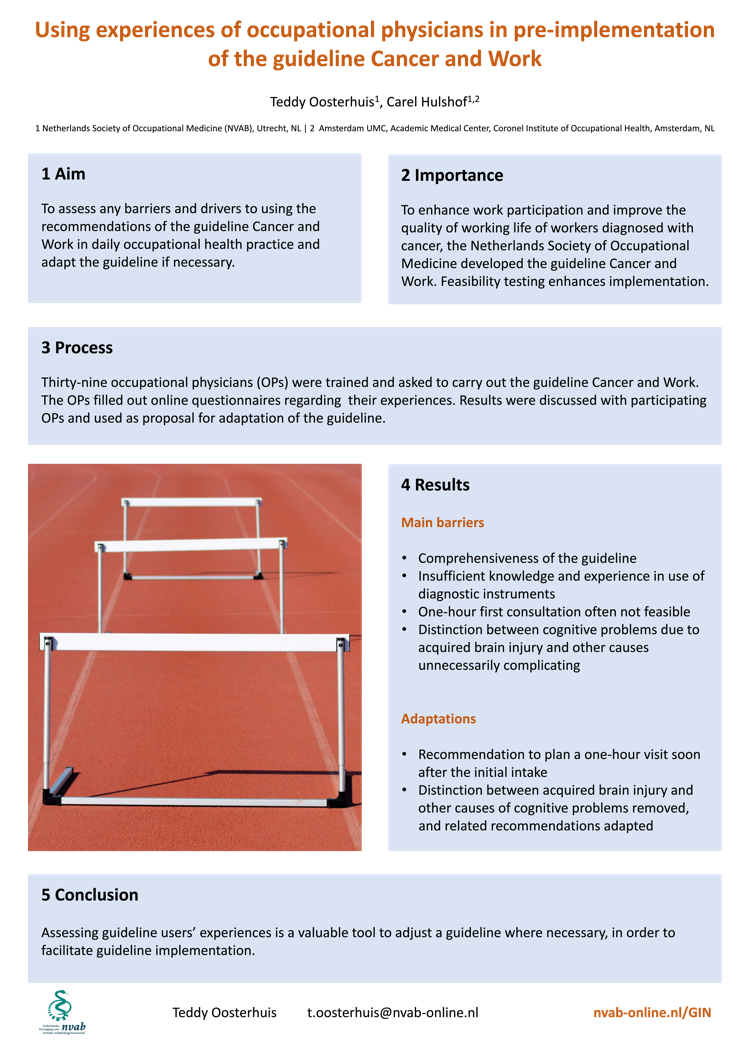Netherlands Society of Occupational Medicine - G-I-N Conference 2019
G-I-N & JBI Conference 2019
The Netherlands Society of Occupational Medicine ('NVAB') presented a poster describing the feasibility test of the guideline Cancer and Work. Experiences of occupational physicians were used to adapt the guideline, to facilitate implementation of the guideline. You can read more and download the poster below.
Using experiences of occupational physicians in pre-implementation of the guideline Cancer and Work
Background
The rising incidence of cancer affects many people at working age. Continuing employment shows to be important for many cancer survivors; work is helpful in regaining a sense of normality and is positively associated with health-related quality of life. The Netherlands Society of Occupational Medicine (NVAB) developed an evidence based guideline on cancer and work. It focuses on interventions to return to work in general, cancer-related fatigue and work-related problems due to mental problems or cognitive disorders. Feasibility testing is expected to enhance implementation of the guideline, by assessing barriers and drivers to using the recommendations of the guideline in daily occupational health practice and subsequently adapting the guideline where necessary.
Methods
Thirty-nine occupational physicians were trained and asked to carry out the guideline. The occupational physicians filled out online questionnaires regarding their experiences, to assess barriers and potential drivers to following the recommendations of the guideline. Furthermore, they registered performance indicators for relevant consultations, i.e. any consults related to cancer, for a period of three months. The aggregated results were then discussed with the participating occupational physicians and used as proposal for adaptation of the guideline. The proposed adaptations were discussed in the guideline development group, and the final version of the guideline was determined.
Results: experiences of the occupational physicians
The occupational physicians (n=17) filled out a questionnaire to assess their experiences with using the guideline in daily practice. Of these, 9 physicians experienced barriers in following one or some recommendations, 12 physicians did not report any barriers.
The comprehensiveness of the guideline was perceived as valuable, but also as a barrier to guideline adherence. Sometimes, it was unclear in which stage recommendations were most relevant. Recommended use of diagnostic instruments (e.g. questionnaires on cancer-related fatigue) was limited due to lack of knowledge and experience in, interpreting results in clinical practice. A one-hour first consultation (intake) as recommended in the guideline was often not feasible. Occupational physicians or the staff planning the consultation hours usually do not know the reason of the employee’s visit, and therefore cannot plan longer visits. The guideline’s distinction between cognitive problems due to acquired brain injury or other causes was perceived as unnecessarily complicating.
Download the poster now: Using experiences of occupational physicians in pre-implementation of the guideline Cancer and Work (pdf)
Dowload performance indicators
Adaptation of the guideline
These results were discussed with the participating physicians. Together, potential solutions for the perceived barriers were formulated. The most important adaptations were:
- a recommendation to plan a one-hour visit soon after the initial intake rather than a one hour intake;
- removal of the distinction between acquired brain injury and other causes of cognitive problems, and adaptations of related diagnostic and therapeutic recommendations.
Conclusions
This pilot implementation of the guideline in a feasibility study provided valuable information for adaptation of the guideline. We expect that this will enhance implementation of the guideline in better practice, to finally improve the quality of working life of workers diagnosed with cancer.

